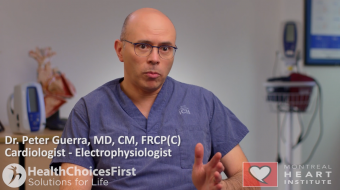Featured Videos
Local Cardiologist are trainer to treat Atrial Fibrillation Causes & Symptoms
Possible causes of atrial fibrillation that Cardiologists treat include:
Atrial Fibrillation Causes & Symptoms
Possible causes of atrial fibrillation include:
• Previous heart attacks
• High blood pressure
• Congenital heart defects
• Coronary artery disease
• Viral infections
• An overactive thyroid gland
Some people with atrial fibrillation have no symptoms. Atrial fibrillation symptoms can include:
• Heart palpitations
• Shortness of breath
• Dizziness
• Fatigue
• Chest pain
Atrial Fibrillation Treatment
Atrial fibrillation isn't usually life threatening, but it is a serious medical condition that requires treatment. If you experience atrial fibrillation symptoms, consult with your doctor. Your physician may recommend an electrocardiogram to diagnose your heart condition. The goal of atrial fibrillation treatment is to restore your normal heart rate and rhythm and prevent blood clots.
The usual treatment for atrial fibrillation usually revolves around one of two kinds of treatments. One is treatment to slow down the heartbeat to make it less rapid and less irregular. That makes most patients feel better. That strategy of slowing down the heartbeat is called rate control. That strategy does not necessarily require the heart rhythm to be restored to normal. There’s a second strategy called rhythm control, which involves treatments to get the heart back to beating normally. It may sound sensible to always want to get the heart beating regularly again, but that is not always easily achieved. Healthy eating is always important. Seeing a local cardiolgist is always important.
The initial treatment in most cases, when the heart is beating fast and irregularly, is to slow it down with medications that are relatively easy to take and safe. That is the rate control strategy. The rhythm control strategy may also require medications, called antiarrhythmic drugs, whose purpose it is to either restore the heartbeat back to normal or to prevent the irregular heartbeats from coming back if the heartbeat is back to normal again. Another type of treatment is called cardioversion, which are small, very safe electrical shocks to the heart, delivered to a patient who’s briefly put to sleep. The cardioversion restores a normal rapid heartbeat. Healthy eating and seeing a registered dietician is important.
The third type of treatment is called ablation, and this is a way of putting wires inside the heart and making small burns inside the heart to get rid of the electrical short circuits that cause atrial fibrillation, in an attempt to prevent the problem from recurring. Ablation can be very effective, but it isn't for all patients.
Talk to your cardiologist if you'd like more information on atrial fibrillation.
Visit HealthChoicesFirst.com for more videos and resources on heart health.
A cardiologist local is a physician with special training and skill in finding, treating and preventing diseases of the heart like atrial fibrilation cholesterol COPD and blood vessels. Local Cardiologists work with patients to treat conditions including coronary artery heart disease, heart attack, atrial fibrillation and irregular heart rhythm. A cardiologist can help you manage risk through nutrition, exercise and lifestyle changes.
-
Rate Control Strategy:
- Initial treatment for a fast and irregular heartbeat.
- Involves medications to slow down the heart rate.
- Medications are generally easy to take and considered safe.
-
Rhythm Control Strategy:
- May also involve medications, specifically antiarrhythmic drugs.
- Goal is to either restore the heartbeat to normal or prevent the recurrence of irregular heartbeats.
-
Cardioversion:
- Involves small, safe electrical shocks to the heart.
- Administered to a patient who is briefly put to sleep.
- Restores a normal, rapid heartbeat.
-
Healthy Eating and Dietician Consultation:
- Emphasizes the importance of maintaining a healthy diet.
- Consulting with a registered dietitian is recommended.
It's essential to note that individual cases may vary, and treatment decisions should be made in consultation with a healthcare professional based on a thorough assessment of the patient's condition. Additionally, lifestyle factors, including diet and exercise, play a crucial role in overall heart health. Regular check-ups and monitoring are important for individuals with heart rhythm disorders.

